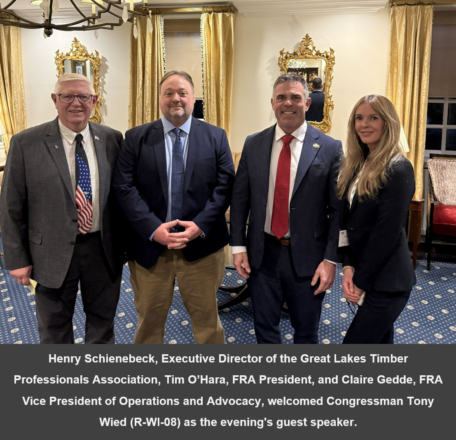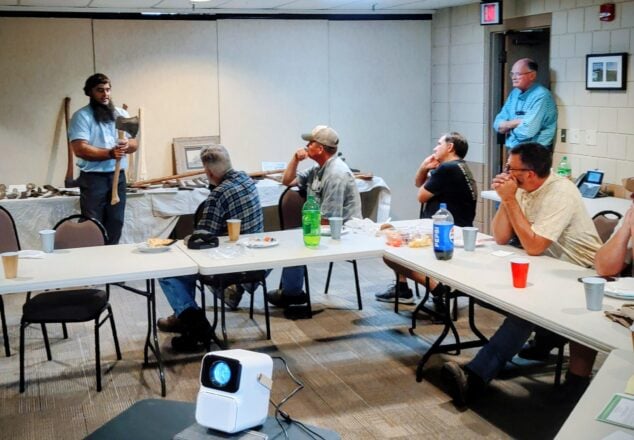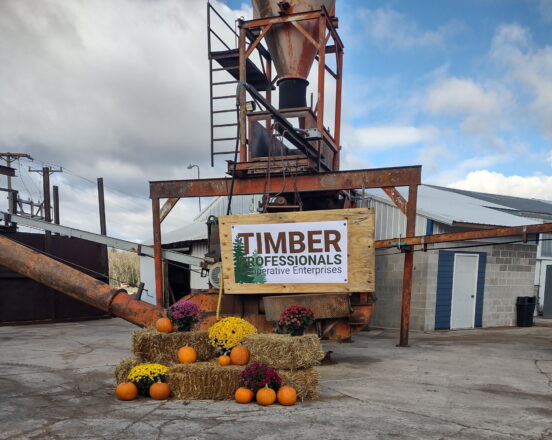Shaping Policy Through Participation: Making an Impact at the FRA Fly-In
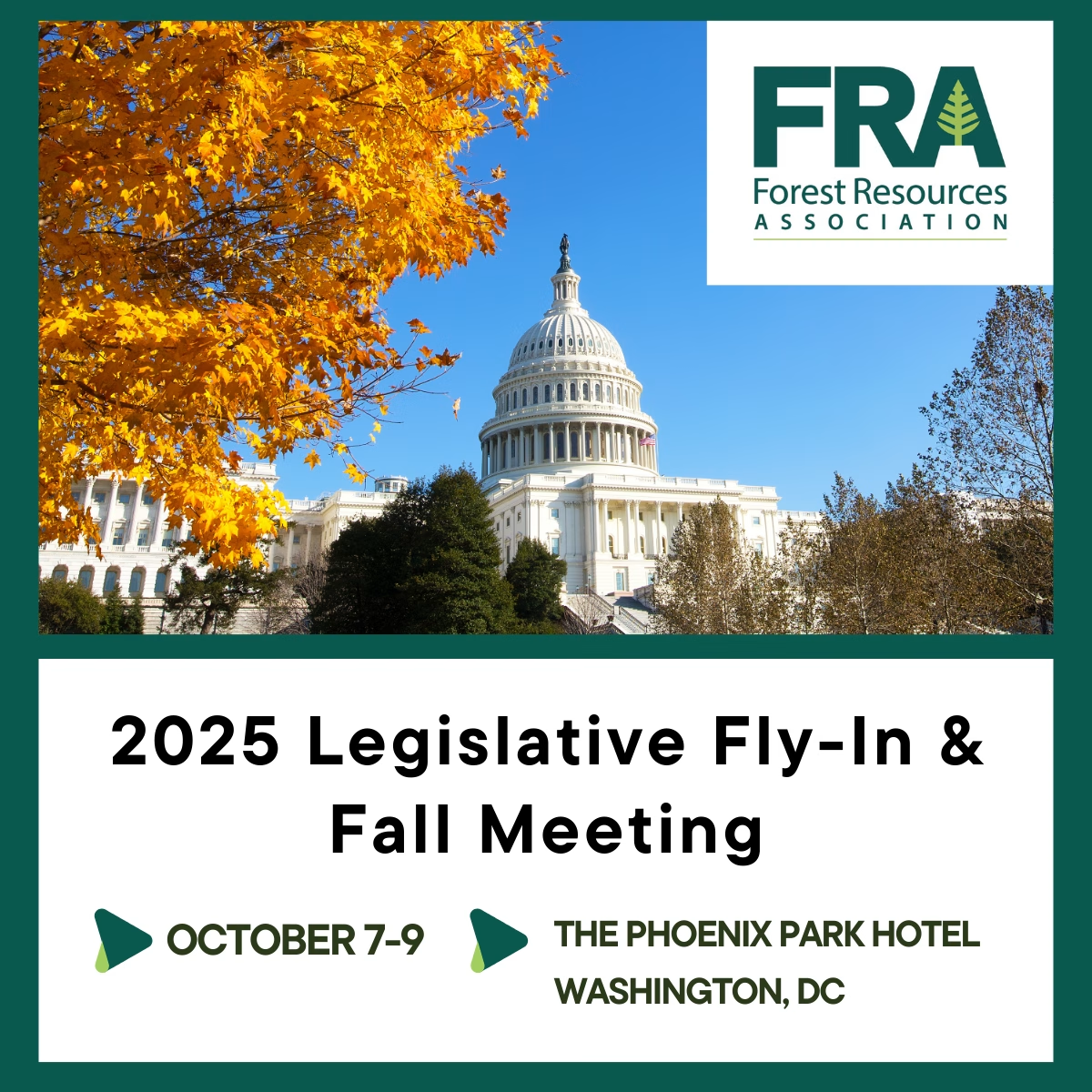
Managed forestlands do more than grow trees—they create family-wage jobs, sustain rural communities, and fuel industries that deliver renewable products Americans rely on every day. Yet the policies that govern how we manage forestlands are often shaped in government chambers far removed from the communities they affect. That’s why participating in a legislative fly-in is one of the most effective ways to ensure your voice is heard where these decisions are made.
This October, FRA will host a fly-in in Washington, DC. This is an important opportunity for our members to engage with legislators to advocate for specific policies that strengthen our industry and their contributions to the broader economy. When members from across the country come together on Capitol Hill with a unified voice, it demonstrates to policymakers that forestry is not just an industry, but an engaged community committed to stewardship, sustainability, and economic vitality.

Why Should I Participate?
We hear it all the time: face-to-face meetings matter. Legislators and their staff are far more likely to remember and consider issues when they hear them directly from constituents or industry experts. Your stories and expertise help shape how they understand the real-world impact of proposed laws. Fly-ins can also build lasting relationships with elected officials and staff, which can be beneficial for future advocacy efforts. Regular engagement builds credibility for you and your business, and meeting with legislators and staff in person helps establish or strengthen connections, ensuring forestry remains on the agenda whenever workforce, transportation, or rural economic issues arise.
Beyond advocacy, fly-ins offer participants a valuable opportunity to network with other industry leaders and professionals in their community. By attending a fly-in, participants can gain exposure to new markets, partnerships, and professional growth.
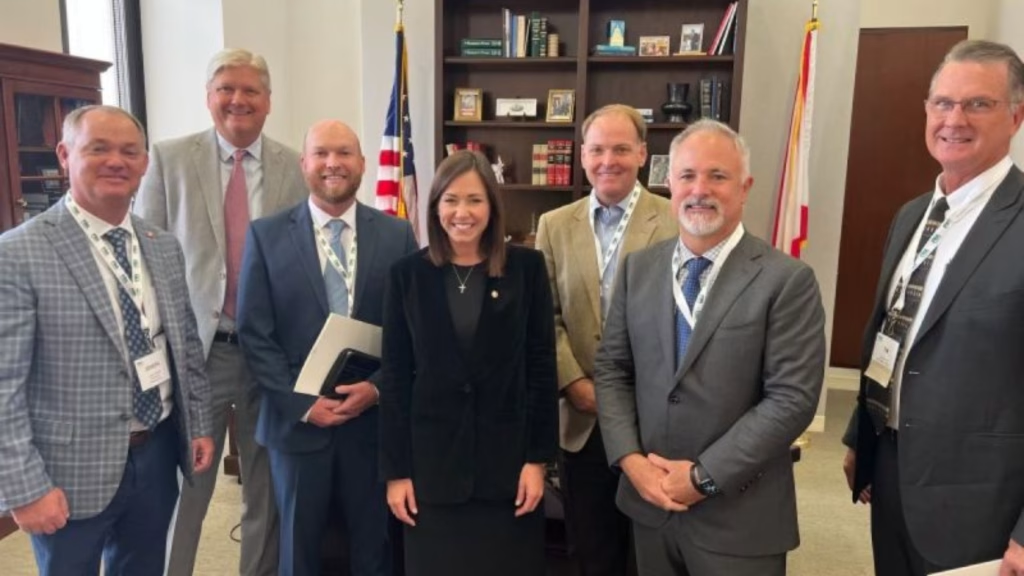
What Are the Policy Priorities We Will Be Addressing?
Our industry faces pressing challenges, including building a robust forestry workforce and ensuring safe and efficient transportation for timber and forest products. Policies affecting these issues are being shaped by Congress now, and it is critical that lawmakers hear directly from those who live and work in forestry every day. Given the Administration and Congress’s pro-industry stance, we have a significant opportunity to advance FRA policy priorities in both transportation and workforce development by addressing workforce shortages through labor solutions tailored to rural economies and enhancing rural transportation and infrastructure to support forest product logistics.
- Workforce – Jobs in the Woods Act (S. 1336, H.R. 4575)
The forestry sector depends on a skilled workforce—from loggers and truck drivers to mill operators and foresters. Yet, rural areas face labor shortages, aging workforces, and difficulties in attracting younger generations. By raising these concerns directly with lawmakers, we can advocate for policies that support training programs, apprenticeships, and rural workforce development.
The Jobs in the Woods Act authorizes the Secretary of Agriculture to establish a competitive grant program that targets forestry workforce development in eligible areas. These areas must be low-income, non-metropolitan regions with reliable broadband access and a population of 20,000 or fewer. Grants are available to nonprofit organizations, states, tribes, local governments, and educational institutions to implement career pathway training programs. Applications must demonstrate program need, reach, sustainability, and partnerships with schools or colleges, with priority given to initiatives that address workforce aging and youth migration and ensure job placement. Grants are capped at $2 million per entity over a maximum four-year period, with $10 million authorized annually from fiscal years 2025 to 2029.
FRA will be requesting members of Congress cosponsor the Jobs in the Woods Act, bipartisan bicameral legislation that addresses critical workforce shortages in the forestry sector.
Issue Brief: Jobs in the Woods Act
- Workforce – H-2B Guestworker Visa Reform
H-2B forestry workers are essential for replanting forestland following timber harvests or natural disasters such as wildfires and hurricanes. Each year, H-2B workers are responsible for replanting seedlings on 85% of the acres on public and private forestlands that require reforestation. The forestry sector relies on seasonal H-2B visa workers when there aren’t enough U.S. workers for these short-term, remote jobs. Only 2% of H-2B forestry jobs are filled by U.S. workers, and the current annual H-2B visa cap of 66,000 is insufficient, with demand exceeding the cap by two to three times.
Currently, the U.S. faces a 3-5+ year backlog in tree planting, which has likely worsened due to recent California wildfires. Without timely access to supplemental H-2B visas, critical reforestation efforts will face significant delays, which will adversely affect water quality, soil stability, wildlife habitats, and future lumber production.
FRA will be requesting that Congress provide permanent and meaningful H-2B cap relief in FY 2026 spending bills or other relevant legislation.
Issue Brief: Why FRA Supports H-2B Reform
H-2B’s Importance to the Forest Products Industry (video)
- Transportation – The Safe Routes Act (S.1063, H.R. 2166)
Trucking is the lifeline of forestry. Each year, more than 15 million truckloads of timber are hauled from forests to mills. Without safe, reliable, and efficient transportation, timber doesn’t reach mills, and products don’t reach markets. Currently, in many states, the gross vehicle weight limits on state roads exceed the federal interstate limit of 80,000 pounds. As a result, fully loaded trucks carrying raw forest products are forced to navigate smaller, secondary roads instead of using more direct interstate routes. This creates unnecessary safety risks for truck operators and the general public. Instead of traveling on well-engineered highways with multiple lanes and controlled access, these trucks must navigate narrow two-lane roads that pass through small towns, school zones, pedestrian crossings, intersections, and stoplights, where the risk of an accident is higher.
The Safe Routes Act amends title 23 of the United States Code to provide a waiver of vehicle weight limits for specific logging vehicles. These vehicles must be transporting raw or unfinished forest products, such as logs or wood chips, and must travel no more than 150 air miles on an interstate from origin to a storage or processing facility. The waiver applies only if the vehicle meets state legal weight tolerances and configuration standards within the state where it operates. The exemption is limited to weight tolerances in effect on the date of enactment of the Act.
FRA will be requesting that members of Congress cosponsor the Safe Routes Act, legislation that allows trucks transporting raw forest products to use the interstate system at state-legal weights.
I Haven’t Participated in a Fly-in Before – What Should I Know?
Be Prepared
- Know FRA’s policy priorities. Review the relevant Issue Briefs ahead of time and reach out to FRA staff with any questions. Ahead of the fly-in, FRA will host a webinar that will walk attendees through the issues we are advocating for in detail and provide an opportunity to ask any questions you may have. There will also be an in-person briefing session the day before the fly-in, where participants will meet with their teams and receive a comprehensive overview of the issues.
- Have district-specific facts: “In Congressman X’s district, forestry supports over 2,500 jobs and contributes $___ to the local economy.” FRA will provide economic data sheets with this information.
- Bring your story and be ready to discuss how regulations impact your business.
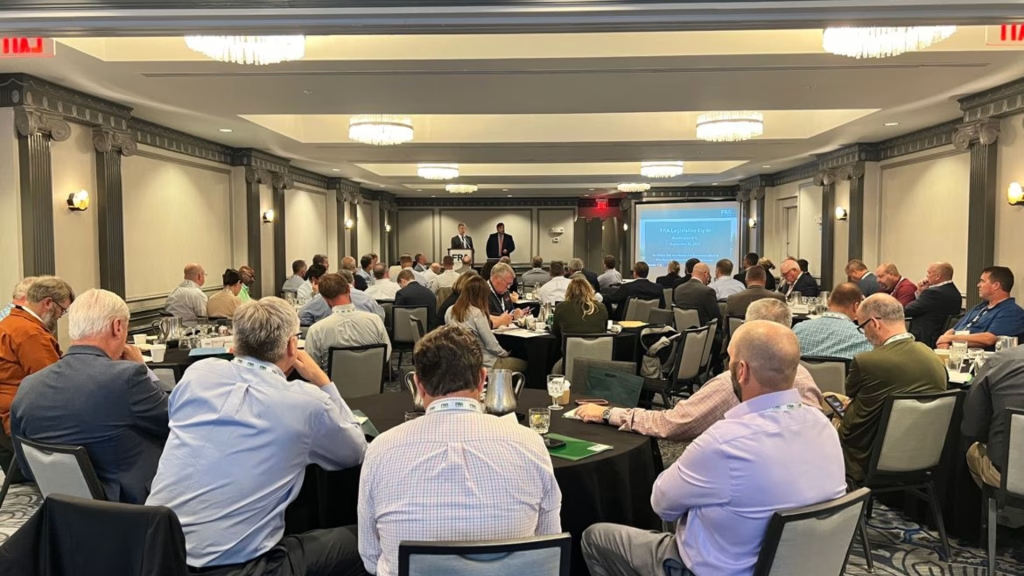
The Meeting
- Make strong introductions: I’m [Name], I work with [Company], representing [#] workers in [state/region].”
- Stress how forestry supports jobs, rural economies, and manufacturing, and tie in local connections where possible. Lawmakers care most about how issues affect their district/state — highlight the mills, family-owned forests, suppliers, or projects in their backyard.
- Be clear about your request and state explicitly what you’d like them to do. FRA will provide talking points to help you.
- FRA will also provide leave-behind packets with copies of our Issue Briefs and contact information.
- Be concise – you may only have 15–20 minutes.
Professionalism and Etiquette
- Be on time, but expect members to run late or leave abruptly.
- Dress code is business attire, but if you have forestry-branded lapel pins/hats for later photo opportunities, please bring them.
- Be respectful and nonpartisan. Even if you disagree, stay professional and polite. You are there to provide information so members can make informed decisions.
- Engage staff seriously. Staffers brief the legislators and can influence their decisions.
Follow-Up
- Thank them for the meeting and reiterate the local impact.
- Offer site visits. Lawmakers enjoy photo opportunities – invite them to a mill, a reforestation project, a timber harvest, or a forest tour.
- Stay visible. Continue sending updates on how federal decisions affect forests, jobs, and sustainability.
Additional Tips
- It can be helpful to divide roles, where one person provides a broad industry view, another shares a personal/business story, and another delivers the “ask.” However, agree on roles ahead of time so the meeting runs smoothly. If you prefer one person to lead the meeting, this works too.
- Frame issues as bipartisan. Forestry typically resonates across the aisle – keep it balanced.
- Don’t be thrown off if they ask questions you can’t answer – say you’ll follow up, and FRA will provide you with supporting information.
- Finally – enjoy the day! You’re shaping the future of forestry by meeting with your legislators in the halls of government.
So, if you’re unsure about the importance of coming to DC, don’t doubt that lawmakers take notice when they see a unified, organized group showing up to advocate. Participating in a legislative fly-in is about more than one day of meetings. It’s about shaping the policies that affect forests, jobs, and rural communities for decades to come. By showing up, sharing your story, and standing together, you help ensure that forestry’s voice is strong in the policymaking process.
